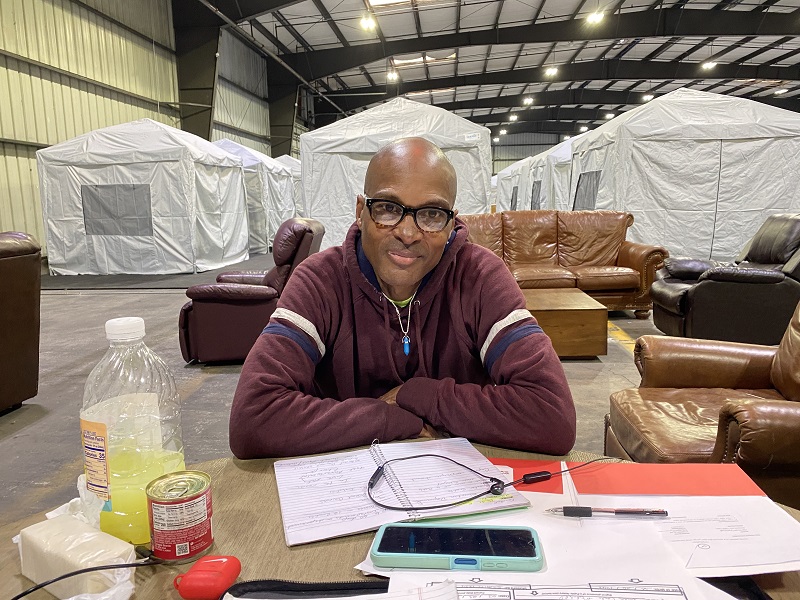
Note: Several guests at the City of Eugene’s 410 Garfield Safe Sleep site recently sat down with St. Vincent de Paul staff to reflect briefly on their experiences, hopes — and struggles — now that they’ve landed in a more stable place on their journey through homelessness. Here’s one of their stories.
On a morning like most others of late, Brian M. sits with schoolwork fanned out before him on a table in the City of Eugene’s 410 Garfield Safe Sleep site. Around him, the shelter’s common area bustles with activity and conversation — likely distractions for someone who’s pursuing a college degree at age 53, after being away from any type of school for 33 years.
“Sometimes it can be hard to block everything out, but that’s why I wear these a lot,” Brian admits with a glance at the earbuds he just removed. “Most times, I’ll be here and I won’t be here,” he jokes.
In reality, Brian’s situation improved immensely when he moved from the Washington Jefferson Park tent encampment to the cleaner, drier, warmer, safer, quieter environs of the Safe Sleep site, which is operated by St. Vincent de Paul.
“Being in a tent was hell,” admits Brian, who lived at the downtown park for several months while experiencing homelessness for the first time in his life and says he felt persistent concern about safety. “It’s no kind of way to live. I thank God nothing ever happened.”
Brian kept up with his studies after becoming unhoused; he says he’s maintained a B average as a full-time psychology student through an online University of Arizona program, for which he earned a full-ride scholarship. He acknowledges “it was very difficult doing that in a tent. It’s a lot easier to focus on work here.
“St. Vincent de Paul has been good to me, and I’m thankful to them for giving me a place that I can be comfortable at,” he adds. “This is a good program you can use to help yourself get from Point A to Point B.”
An undergraduate psychology major with a focus on drug and alcohol abuse, Brian’s academic focus reflects his motivation for his past to dictate his future.
“I said, well, I’m going back to school for something I was very good at — drugs and alcohol. I was addicted 20 years ago, and I mean very addicted. That’s another thing that pushes me with school; I just hated what I looked at in the mirror one day, and that was back in 2000. That’s what made me want to live again.”
After earning his degree about two years from now, Brian wants to help empower others with the right attitude and resources to create change in their lives. “I want to help people. I want people to know that you can change. It’s going to take some work on your part, but it can be done.”
His specific goals are to become a substance-abuse counselor and start a halfway house, where people in recovery can get back on their feet, when he eventually returns to his home state of North Carolina.
Brian had moved from the East Coast with a girlfriend to Portland, but after that relationship ended, he still wanted to make a go of living on the West Coast. Recently, he met and married someone else from the Eugene area, but they encountered an unexpected housing-related legal challenge that has pushed back the creation of their own shared household — even though she visits him every day.
“It’s hard, your wife being in one place and you being in another,” Brian says. “But everything easy ain’t good for you. Sometimes the hard thing is what molds you and makes you, and sometimes you have to get away from your comfort zone in order to find yourself.”
As he dons his headphones again and prepares to refocus on his studies, Brian grins and speaks with an air of experience-informed confidence:
“It ain’t easy, but it’s going to work out.”
